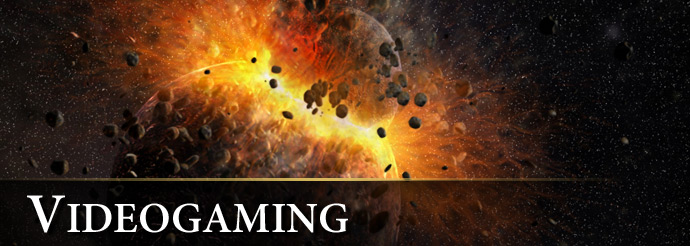
CyGaMEs Tallies Many Accomplishments in 2012
The CyGaMEs project continued to achieve great success in 2012, with the Selene videogame at the core of the project being selected as one of the top 10 educational videogames in a prestigious international competition and introducing a bilingual version of the game highlighting the numerous accomplishments. Originally funded by NASA to study videogame learning, the project completed its third year of National Science Foundation funding with numerous accomplishments:
- Selene goes bilingual with the release of Spanish Selene in September.
- Dr. Barbara G. Tabachnick, CyGaMEs statistics consultant and coauthor, received the Western Psychological Association Lifetime Achievement Award.
- Dr. Debbie Denise Reese, senior educational researcher and principal investigator of the CyGaMEs project, had a chapter accepted for publication in the upcoming edited volume, Digital Knowledge Maps in Education: Technology Enhanced Support for Teachers and Learners.
- The CyGaMEs team recognized Julie Ogden, a New Jersey teacher, as a featured recruiter for her efforts in bringing more than 100 players to Selene and promoting its efforts to study how and when people learn while playing videogames.
- Selene was named a top finalist in the games and apps category of the International Science & Engineering Visualization Challenge sponsored by the National Science Foundation and the journal Science. Winners will be announced in February and will be featured in an upcoming Science issue as well as on its companion website, Science Online. The first version of Selene was a semifinalist in the 2007 International Science & Engineering Visualization Challenge.
- CyGaMEs partnered with the National Association for Bilingual Education (NABE) to form a special interest group to leverage primary language linguistics and Selene to increase STEM achievement toward the New Science Education Standards in middle school Earth and space science.
- Reese published a chapter:
- Reese, D. D., Seward, R. J., Tabachnick, B. G., Hitt, B., Harrison, A., & McFarland, L. (2012). Timed Report measures learning: Game-based embedded assessment. In D. Ifenthaler, D. Eseryel, & X. Ge (Eds.), Assessment in game-based learning: Foundations, innovations, and perspectives (pp. 145-172). New York: Springer.
- Reese participated in the following panel discussions:
- Ifenthaler, D., Eseryel, D., Ge, X., Ke, F., Warren, S., Loh, C. S., . . . Reese, D. D. (2012). Assessment in game-based learning (panel). Paper presented at the annual international convention of the Association for Educational Communications and Technology, Louisville, KY.
- Reese, D. D. (2012, November). Mapping pragmatics and structure: CyGaMEs approach to instructional games with embedded assessment. Visiting Expert Panel Presentation, Center for Advanced Technology in Schools (CATS) Seminar. University of California, Los Angeles.
- Reese published a report:
- Reese, D. D., & Gobert, J. (2012). Knowledge specification: A priori requirement for effective embedded assessment. In M. Timms (Ed.), New measurement paradigms (pp. 18-32). Boston: Retrieved from CADRE (Community for Advancing Discovery Research in Education) Education Development Center website: http://cadrek12.org/sites/default/files/NMP%20Report%20041412_0.pdf.
- Reese participated in the following structured poster sessions:
- Hitt, B. A., & Reese, D. D. (2012, April). Knowledge discovery from Selene data. In Eric Wiebe (Chair) (Ed.), New measurement paradigms: Psychometric methods for technology-based assessments. Structured poster session presented at the annual meeting of the American Educational Research Association. Vancouver, BC.
- Reese, D. D. (2012, April). Knowledge specification: A priori requirement for effective embedded assessment. In Eric Wiebe (Chair) (Ed.), New measurement paradigms: Psychometric methods for technology-based assessments. Structured poster session presented at the annual meeting of the American Educational Research Association. Vancouver, BC.
- Selene was featured as a sidebar in the following U.S. Department of Education report as an example of learning analytics:
- Bienkowski, M., Feng, M., & Means, B. (2012). Enhancing teaching and learning through educational data mining and learning analytics. Washington. DC: Retrieved from U.S. Department of Education: Office of Educational Technology website: http://ctl2.sri.com/eframe/wp-content/uploads/2012/04/EDM-LA-Brief-Draft_4_10_12c.pdf
Lectures and Workshops - Reese served as a guest lecturer:
- Reese, D. D. (2012, April). Assessment and design for nonobservable outcomes in games. Guest lecture, University of North Dakota Instructional Design and Technology game development class: IDT545.
- Reese also developed and disseminated MoonGazers activities for integrating Selene with classroom activities, lunar observational, and astrophotography. She conducted professional development workshops face-to-face (e.g., Challenger) and via webinar (e.g., Yerkes Observatory, Wisconsin):
- Reese, D. D. (2012, September). Engaging gameplay and hands-on activities. Stars at Yerkes Workshop (webinar). Williams Bay, WI.
- Reese, D. D. (2012, August). Selene and MoonGazers: Engaging gameplay and hands-on activities. Annual conference of the Challenger Center for Space Science Education. Chattanooga, TN.
- Reese, D. D. (2012, April). To the Moon through game-based learning and assessment. Talk presented at the Southeast Pennsylvania American Association of Physics Teachers spring meeting, Philadelphia.
- Reese, D. D. (2012, March). MoonWorld: Lunar geology fieldwork in a virtual world. Talk presented at the annual conference of the National Science Teachers Association, Indianapolis.
- Reese, D. D. (2012, March). MoonGazers: CyGaMEs Selene, MoonWorld, and hands-on unit activities. Series of talks presented at the spring instructional technology training for the Diocese of Wheeling-Charleston.
- Reese, D. D. (2012, March). Reach for the Moon: Engaging gameplay and hands-on activities. 4th Annual NASA Educatorís Workshop for STEM (NEWS). Charlotte, NC.
Publications and Presentations
MoonWorld
The NASA-sponsored Classroom of the Future's MoonWorld project was closed out early in 2012. Our findings from our research into creating a virtual world in which to teach NASA science are available on the MoonWorld website. Among the lessons learned:
- MoonWorld can be an engaging & effective learning tool, supporting collaborative investigations and sound scientific practice, making and warranting claims through evidence.
- Users love avatars, spacesuits, being on Moon.
- Learners tend to explore on their own rather than to follow stations sequence and answer questions.
